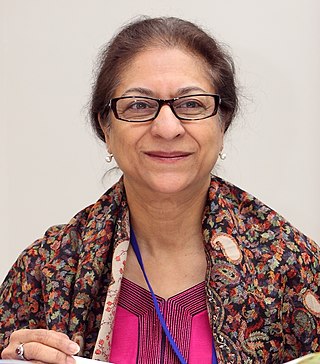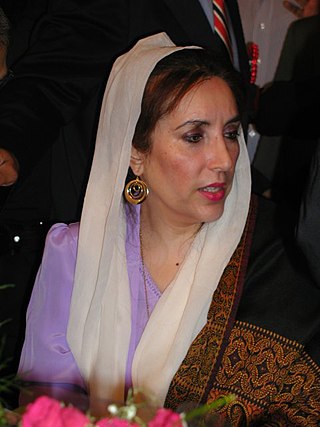
The Hudud Ordinances are laws in Pakistan enacted in 1979 as part of the Islamization of Pakistan by Muhammad Zia-ul-Haq, the sixth president of Pakistan. It replaced parts of the British-era Pakistan Penal Code, adding new criminal offences of adultery and fornication, and new punishments of whipping, amputation, and stoning to death. After much controversy and criticism parts of the law were extensively revised in 2006 by the Women's Protection Bill.

Hina Jilani is a lawyer on the Supreme Court of Pakistan and a human rights activist from Lahore, Punjab. She is the co-founder of Pakistan's first all-women law firm, Pakistan's first legal aid centre, and the Women's Action Forum.

Asma Jilani Jahangir was a Pakistani human rights lawyer and social activist who co-founded and chaired the Human Rights Commission of Pakistan and AGHS Legal Aid Cell. Jahangir was known for playing a prominent role in the Lawyers' Movement and served as the United Nations Special Rapporteur on Freedom of Religion or Belief and as a trustee at the International Crisis Group.

The Human Rights Commission of Pakistan (HRCP) is an independent, democratic non-profit organisation. Founded in 1987, it is one of the oldest human rights organisations in the country.
Saneeya Hussain was a Pakistani journalist and environmentalist. She married a Brazilian man in 1998 and died in Brazil in 2005.

Women in Pakistan make up 48.76% of the population according to the 2017 census of Pakistan. Women in Pakistan have played an important role in Pakistani history and have had the right to vote since 1956. In Pakistan, women have held high office including Prime Minister, Speaker of the National Assembly, Leader of the Opposition, as well as federal ministers, judges, and serving commissioned posts in the armed forces, with Lieutenant General Nigar Johar attaining the highest military post for a woman. Benazir Bhutto was sworn in as the first woman Prime Minister of Pakistan on 2 December 1988.
The Women's Protection Bill which was passed by the National Assembly of Pakistan on 15 November 2006 is an attempt to amend the heavily criticised 1979 Hudood Ordinance laws which govern the punishment for rape and adultery in Pakistan. Critics of the Hudood Ordinance alleged that it made it exceptionally difficult and dangerous to prove an allegation of rape, and thousands of women had been imprisoned as a result of the bill. The bill returned a number of offences from the Zina Ordinance to the Pakistan Penal Code, where they had been before 1979, and created an entirely new set of procedures governing the prosecution of the offences of adultery and fornication. Whipping and amputation were removed as punishments. The law meant women would not be jailed if they were unable to prove rape and their complaints of rape would not be seen as confession of adultery.

JusticeNasira Javid Iqbal is a Pakistani jurist and law professor who served as a justice of the Lahore High Court from 1994 to 2002.
Ibn Abdur Rehman, also known as I.A. Rehman was a Pakistani peace and human rights advocate, a veteran communist and a journalist.
Women's Action Forum (WAF) is a women's rights organization in Pakistan.

Farida Shaheed is a Pakistani sociologist and feminist human rights activist. In 2012, she was appointed the United Nations Special Rapporteur in the field of cultural rights, while she held that role in the field of education from 2022. She heads the Shirkat Gah women's resource centre in Pakistan, and is known for her extensive work on gender and class analysis, both in Pakistan and more globally.
Najma Sadeque from Pakistan was a leading woman journalist, author, human rights activist, particularly of women's rights, an artist, an environmentalist, and a painter. She also did research on socioeconomic issues and authored many books and wrote articles. She co-founded Shirkat Gah in 1975, a women's NGO to highlight human rights violations against women. She also co-founded the Women’s Action Forum (WAF), Pakistan.
Lala Rukh, was a prominent Pakistani teacher, women's rights activist and artist who was known as founder of Women's Action Forum.
Feminism in Pakistan refers to the set of movements which aim to define, establish, and defend the rights of women in Pakistan.This may involve the pursuit of equal political, economic, and social rights, alongside equal opportunity. These movements have historically been shaped in response to national and global reconfiguration of power, including colonialism, nationalism, Islamization, dictatorship, democracy, and the War on Terror. The relationship between the women's movement and the Pakistani state has undergone significant shifts from mutual accommodation to confrontation and conflict.

Khawar Mumtaz is a Pakistani women's rights activist, feminist author and university professor. She is the Former Chairperson of the National Commission on the Status of Women (NCSW) who served for three consecutive terms from 2013 to 2019.
Hilda Saeed is a Pakistani activist and freelance journalist. She is chair of Shirkat Gah and a founding member of the Women's Action Forum (WAF) in Pakistan and of the Pakistan Reproductive Health Network.
Fauzia Viqar is a Pakistani human rights activist with a focus on women's rights. She served as the first chairperson of the Punjab Commission on the Status of Women from 2014 to 2019.
Sanna Ejaz or Sana Ijaz, is a Pakistani journalist and human rights activist from Khyber Pakhtunkhwa. She is a leading member of the Pashtun Tahafuz Movement (PTM), as well as a founding member of the Waak Movement, which aims to bring political awareness among Pashtun women. She focuses on advocacy to promote women's role in peacebuilding, reconciliation, and social activism. She was formerly the vice-president of the youth wing of Awami National Party (ANP).
Aisha Gazdar is a Pakistani journalist, writer, filmmaker and a researcher for documentaries. She is known for her award-winning film: The Honor Deception. She is the daughter of Mushtaq Gazdar.
Shirkat Gah women's resource centre, is a women's rights organization in Pakistan which focuses on research, publications and advocacy on women's issues.







